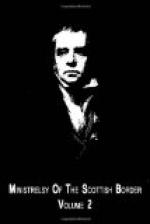“O horse, O horse, now billie Graeme,
“And get thee far from
hence with speed;
“And get thee out of this country,
“That none may know
who has done the deed.”
“O I have slain thee, billie Bewick,
“If this be true thou
tellest to me;
“But I made a vow, ere I came frae
hame,
“That aye the next man
I wad be.”
He has pitched his sword in a moodie-hill,[C]
And he has leap’d twentie
lang feet and three,
And on his ain sword’s point he
lap,
And dead upon the grund fell
he.
’Twas then came up Sir Robert Bewick,
And his brave son alive saw
he;
“Rise up, rise up, my son,”
he said,
“For I think ye hae
gotten the victorie.”
“O hald your tongue, my father dear!
“Of your prideful talking
let me be!
“Ye might hae drunken your wine
in peace,
“And let me and my billie
be.
“Gae dig a grave, baith wide and
deep,
“A grave to hald baith him
and me;
“But lay Christie Graeme on the
sunny side,
“For I’m sure he wan
the victorie.”
“Alack! a wae!” auld Bewick
cried,
“Alack! was I not much to
blame!
“I’m sure I’ve lost
the liveliest lad
“That e’er was born
unto my name.”
“Alack! a wae!” quo’
gude Lord Graeme,
“I’m sure I hae lost
the deeper lack!
“I durst hae ridden the Border through,
“Had Christie Graeme been
at my back.
“Had I been led through Liddesdale,
“And thirty horsemen guarding
me,
“And Christie Gramme been at my
back,
“Sae soon as he had set me
free!
“I’ve lost my hopes, I’ve
lost my joy,
“I’ve lost the key but
and the lock;
“I durst hae ridden the world round,
“Had Christie Graeme been
at my back.”
[Footnote A: The ostler’s copy reads very characteristically— “It was all for good wine and hay.”]
[Footnote B: Ackward—Backward.]
[Footnote C: Moodie-hill—Mole-hill.]
THE DUEL OF WHARTON AND STUART. IN TWO PARTS.
Duels, as may be seen from the two preceding ballads, are derived from the times of chivalry. They succeeded to the combat at outrance, about the end of the sixteenth century; and, though they were no longer countenanced by the laws, nor considered a solemn appeal to the Deity, nor honoured by the presence of applauding monarchs and multitudes, yet they were authorised by the manners of the age, and by the applause of the fair.[A] They long continued, they even yet continue, to be appealed to, as the test of truth; since, by the code of honour, every gentleman is still bound to repel a charge of falsehood with the point of his sword, and at the peril of his life. This peculiarity of manners, which would have surprised an ancient Roman, is obviously deduced from the Gothic ordeal of trial by combat. Nevertheless,




